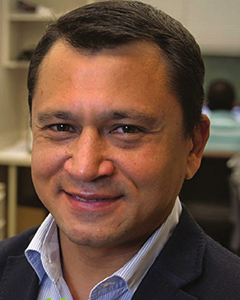Past Events
Richard Socher, Salesforce: The Natural Language Decathlon: Multitask Learning as Question Answering

Deep learning has improved performance on many natural language processing (NLP) tasks individually. However, general NLP models cannot emerge within a paradigm that focuses on the particularities of a single metric, dataset, and task.
The mind in your pocket: On the neuroethical implications of smartphones as extensions of our minds - Peter B. Reiner, University of British Columbia

It is hard to overstate the degree to which information technology has permeated modern life. For many, reliance on their devices begins when they awaken, continues throughout the day and ends only when they drift off to sleep.
AI and Moral Intelligence: Preserving Humane Thinking in a Machine Age - Shannon Vallor, Santa Clara University

In the coming decades, the spread of commercially viable artificial intelligence is projected to transform virtually every sociotechnical system, from finance and transportation to healthcare and warfare. Less often discussed is the growing impact of AI on human practices of self-cultivation, those critical to the development of intellectual and moral virtues.
Algorithmic Accountability: Designing for Safety - Ben Shneiderman, University of Maryland

Vital services, such as communications, financial trading, healthcare, and transportation depend on sophisticated algorithms, some relying on unpredictable artificial intelligence techniques, such as deep learning, that are increasingly embedded in complex software systems.
Artificial Intelligence: From Analog to Digital and Back - George Dyson

The digital revolution, conceived in the 17th century, took electronic form when stored- program computers broke the distinction between numbers that mean things and numbers that do things in the aftermath of World War II. Nature uses digital coding, embodied in strings of nucleotides, for the storage, modification, error correction, and conveying of instructions from one generation to the next, but relies on analog coding, embodied in brains and nervous systems, for real-time intelligence and control. Technology will follow.
What is the value of an action in ice hockey? Deep Reinforcement Learning for Context-Aware Player Evaluation - Oliver Schulte and Guiliang Liu, Simon Fraser University
A fundamental goal of sports analytics is to rank player performance. A common approach is to assign a value to each player action and rank a player by his or her aggregate action value. For measuring the value of an action, a recent AI-based approach, successful in a variety of team sports, estimates its expected impact on team success (e.g., the team’s chance of scoring the next goal).
Biomimetic robots as neuroscientific models and therapeutic tools - Tony Prescott, Director of Sheffield Robotics

Biomimetics is the approach of abstracting principles from nature to assist in the understanding of living systems and the design of novel technologies. At Sheffield Robotics we are using a biomimetic approach to develop robots with brain-like control systems and we are applying this approach to both humanoid robots, such as the European iCub, and to new animal-like robots.
Drugging the ‘Undruggable”. Computer-Aided Drug Discovery of Novel Cancer Drugs - Artem Cherkasov, Faculty of Medicine at UBC

Small-molecule drug design is a complex and iterative decision-making process relying on pre-existing knowledge and driven by experimental data. Low molecular weight chemicals represent an attractive therapeutic option as they are readily accessible to organic synthesis and can easily be characterized.
CAIDA AI-Technical Seminar - The Merits of Models in Continuous Reinforcement Learning, Benjamin Recht (University of California, Berkeley)

Classical control theory and machine learning have similar goals: acquire data about the environment, perform a prediction, and use that prediction to positively impact the world. However, the approaches they use are frequently at odds.
Towards Verified Stochastic Variational Inference for Probabilistic Programs - Hongseok Yang, Professor, KAIST

Abstract: Probabilistic programming is the idea of writing models from statistics and machine learning using program notations and reasoning about these models using generic inference engines. Recently its combination with deep learning...
Pagination
- Page 1
- Next page